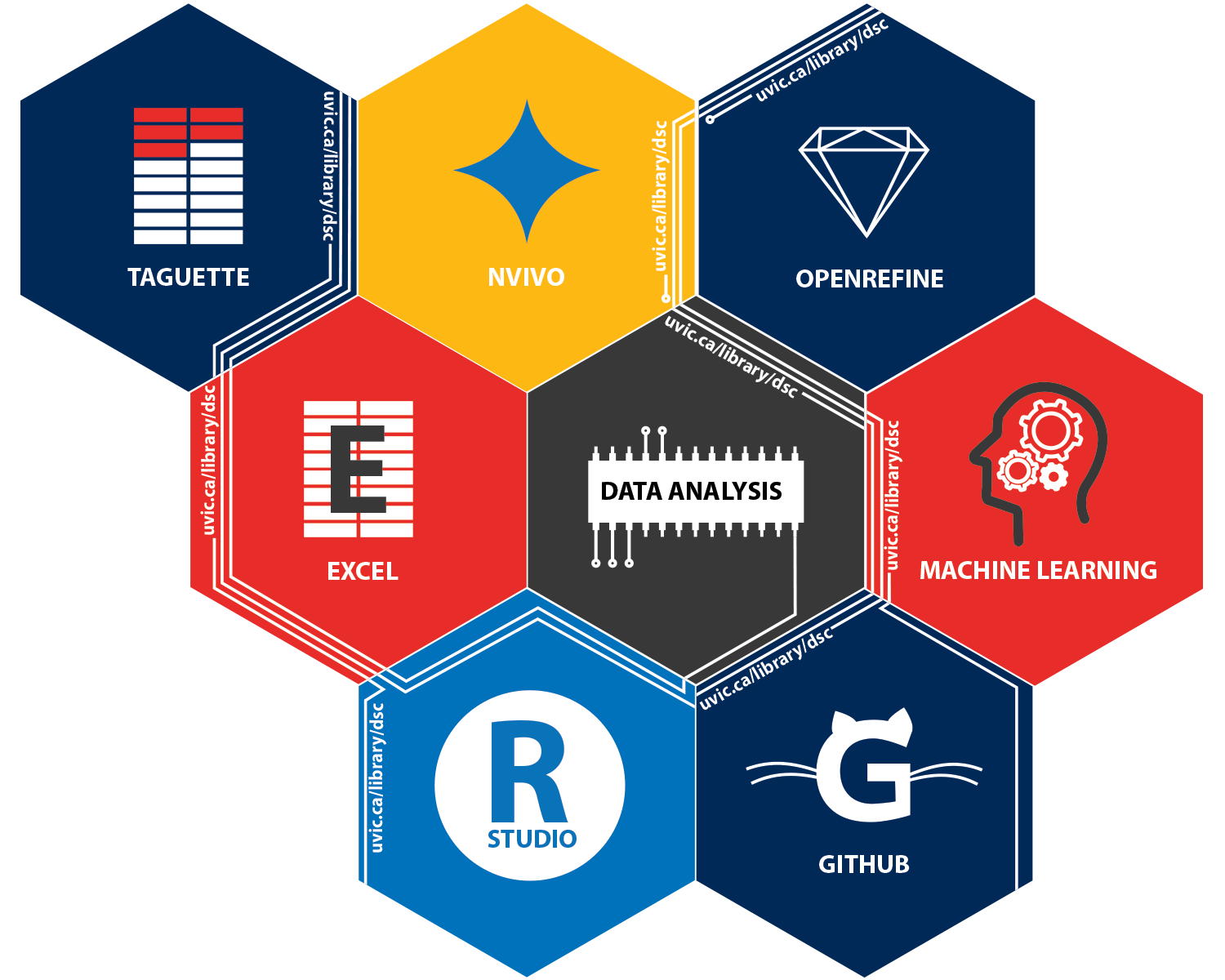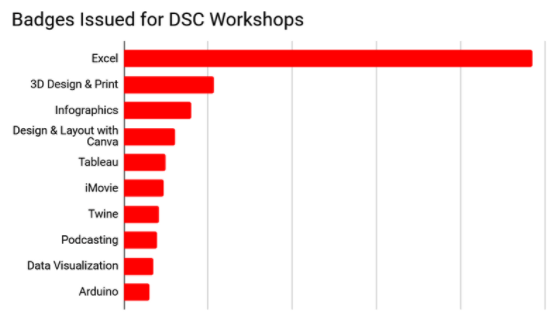[et_pb_section fb_built=”1″ admin_label=”section” _builder_version=”4.16″ global_colors_info=”{}”][et_pb_row admin_label=”row” _builder_version=”4.16″ background_size=”initial” background_position=”top_left” background_repeat=”repeat” global_colors_info=”{}”][et_pb_column type=”4_4″ _builder_version=”4.16″ custom_padding=”|||” global_colors_info=”{}” custom_padding__hover=”|||”][et_pb_text admin_label=”Text” _builder_version=”4.16″ background_size=”initial” background_position=”top_left” background_repeat=”repeat” global_colors_info=”{}”]
Training, tools, & support to help UVic community members pursue their passions & tell their research stories in engaging ways.
[box]
Please note that this document is available in three different formats:
-
- This Web Page is best for reading on a cellphone or computer
- PDF – formatted for printing or reading on a computer
- Infographic – report highlights for sharing
[/box]
Scholarship & Knowledge Mobilization
We had a busy 2021 in the Digital Scholarship Commons (DSC) as we continued to help students, faculty, and staff learn to tell stories about their research in ways beyond text in order to further their public scholarship and knowledge mobilization efforts.
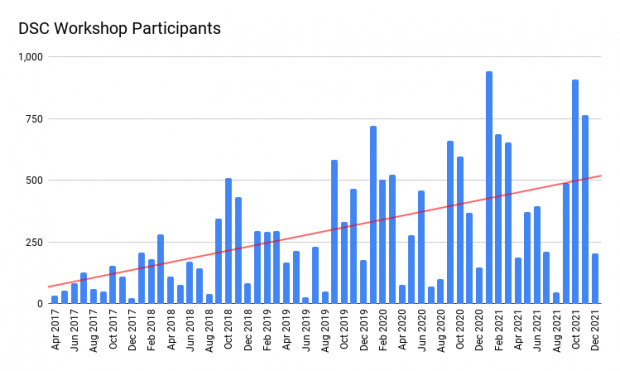
The number of digital information fluency workshop participants was up 30% over 2020, and we taught a staggering 5,856 individuals. Data Analysis with Excel was our most popular workshop, followed by Video Editing and 3D Design & Print. The DSC collaborated with 19 disciplines to integrate DSC workshops into their curriculums. The Faculty of Education, Peter B. Gustavson Faculty of Business, and the Department of Anthropology were our most frequent collaborators.
We received numerous “thank you” notes from instructors throughout the year, including this one from Dr. Renée Monchalin of the School of Public Health & Social Policy, who emailed us saying:
“Thank you so much for a wonderful infographics workshop today. It was very informative, and I have had students let me know how useful it was. Thanks again and I will definitely be looking for more workshops to incorporate into my courses! 😊”
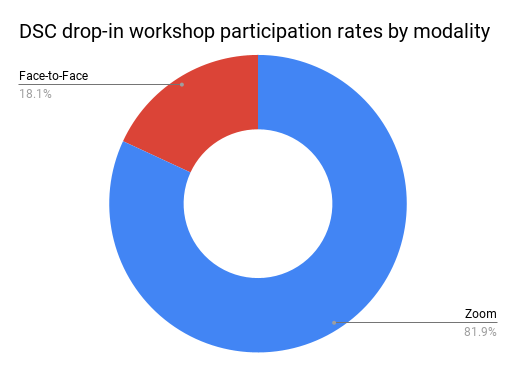
Interestingly, in the fall of 2021, when in-person DSC workshops were offered in a “hyflex” format (participants could learn either in person or via Zoom), 18% chose to attend in person and 82% chose to participate via Zoom. We suspect that students preferred online learning in 2021 because of concerns around COVID-19; but, we also had a higher percentage of graduate student workshop attendees–-grads tend to value scheduling flexibility and thus may prefer Zoom.
This is unexpected but useful information as we schedule workshops throughout 2022.
Our Move to Hybrid Flexible Workshops
In the summer and fall of 2021, DSC staff updated many of our workshops to an Active Learning – Hyflex format (infographic source), which allows learners to participate in our workshops in one of three ways: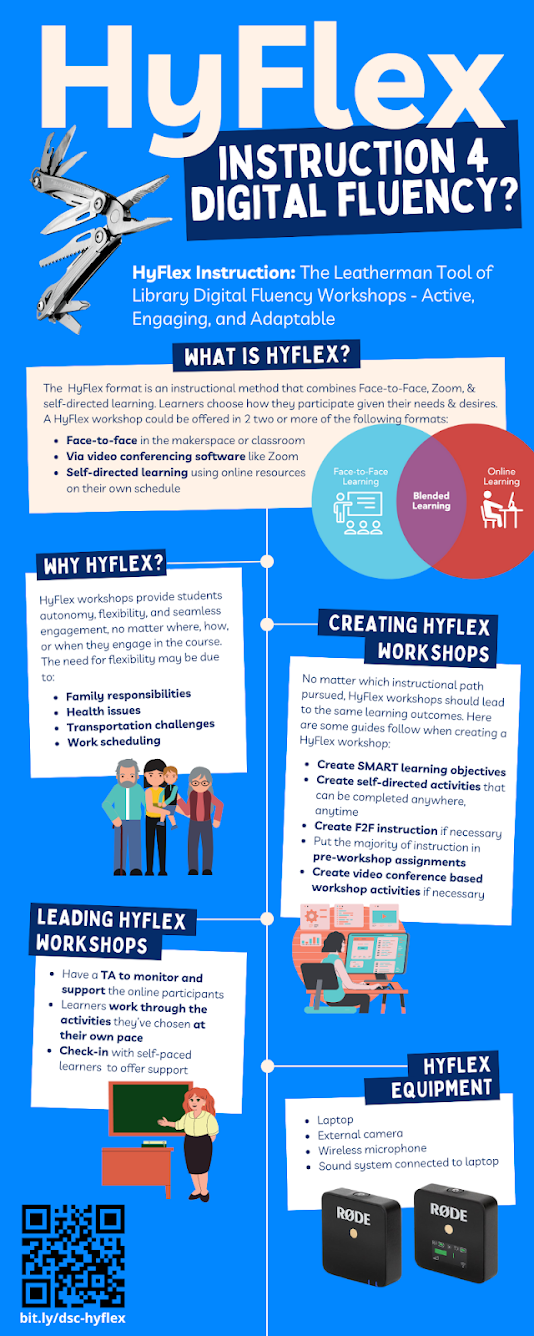
- Face-to-face in the DSC classroom
- Face-to-face (virtually) via Zoom
- Or by working through workshop materials at their own pace.
Feedback from our Hyflex, face-to-face, and Zoom workshop participants has been overwhelmingly positive. Learners are appreciative of the opportunity to choose how to engage with our workshops to best meet their educational and personal needs. We are in the process of documenting the way we run our Hyflex workshops to share with instructors on campus and beyond UVic.
We continue to work on migrating our Digital Information Fluency workshops from Google Docs to the GitHub platform; as we do so, we are updating them to better support Hyflex – Active Learning and teaching. This work not only provides a better experience for workshop participants, but also allows for easier collaboration with our digital scholarship library colleagues around the globe. Anyone, including learners themselves, can copy any of our workshops with the click of a button for their personal use or for use at their own institutions. Another benefit of GitHub is that users can easily contribute back any improvements they have made to the original workshop, thereby augmenting our own teaching.
Select Collaborations with Faculty and Community
Peter B. Gustavson Faculty of Business Excel Training:
We have extended our collaboration with the Peter B. Gustavson Faculty of Business beyond Excel workshops for incoming BComm students by helping the faculty create a BrightSpace Excel course using the DSC curriculum. All incoming students can work through our Excel workshop materials at their own pace. Faculty & staff have added to the workshop by adding multiple-choice questions to BrightSpace to help make evaluation more efficient and make it easier for students to demonstrate their competency using Excel. This approach also provides a way for students with previous Excel experience to show their competency without necessarily completing all of the workshop activities.
Support for Esquimalt and W̱SÁNEĆ Language Revitalization
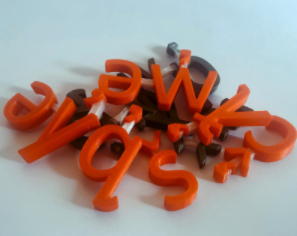 Early in 2021 we partnered with the Esquimalt and W̱SÁNEĆ First Nations to design and 3D-print sets of letters for their respective alphabets to use in their K-12 and other language classes. Our wonderful DSC Intern, Kenzie Wong, did the initial design work in Tinker Cad / Fusion 360 and then started printing letter sets. The project should be finished in early 2022 by our DSC Intern, Nathaniel Loman, who picked up where Kenzie left off. We are so happy to be able to support both the Esquimalt and W̱SÁNEĆ language revitalization efforts in this way.
Early in 2021 we partnered with the Esquimalt and W̱SÁNEĆ First Nations to design and 3D-print sets of letters for their respective alphabets to use in their K-12 and other language classes. Our wonderful DSC Intern, Kenzie Wong, did the initial design work in Tinker Cad / Fusion 360 and then started printing letter sets. The project should be finished in early 2022 by our DSC Intern, Nathaniel Loman, who picked up where Kenzie left off. We are so happy to be able to support both the Esquimalt and W̱SÁNEĆ language revitalization efforts in this way.
The DSC not only designed and 3D-printed letters, but we also made cookie-cutters of the letters for baking as well as embossed letter blocks for preschool and early-education students. In addition, we have given the 3D-model files of all the letters to each community so that they can print more letters on their own, or use them in other language revitalization projects.
Engineering – 3D Design & Print
Another example of cross-campus collaboration is when Aditi Gupta, our wonderful Engineering & Science Librarian, introduced Dr. Ilamparithi from the Department of Electrical & Computer Engineering to the workshops and services offered by the DSC. After a conversation about the needs of his class, Dr. Ilamparithi invited Rich and Dani to lead a 3D-Design workshop. 191 of Dr. Ilamparithi’s students participated in the workshop that we modified to help them create custom 3D-designed and printed parts for their VEX robotics kits.
Digital Badges & Informal Credentialing
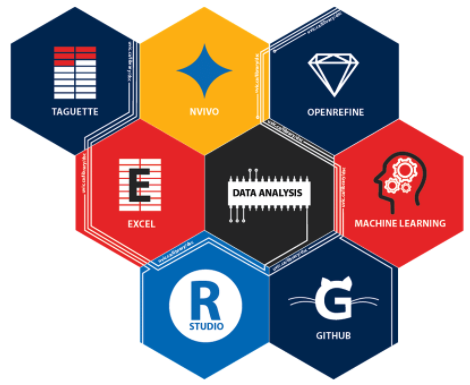 The DSC informal credentialing pilot project continued in 2021; a total of 578 badges were issued for the successful completion of digital information fluency workshops over the course of the year. Students had to explicitly opt-in to receive a badge, at which point the workshop instructor reviewed the work to make sure it met the requirements for earning a badge.
The DSC informal credentialing pilot project continued in 2021; a total of 578 badges were issued for the successful completion of digital information fluency workshops over the course of the year. Students had to explicitly opt-in to receive a badge, at which point the workshop instructor reviewed the work to make sure it met the requirements for earning a badge.
As part of an HERB-approved research project, the DSC gathered mixed-methods data to evaluate the perceived value of badges by students who received them. Of particular interest is how students perceive the DSC badges as being valuable in helping them obtain co-op or post-graduation employment. Analysis of the data is ongoing, and results should be published in the summer of 2022.
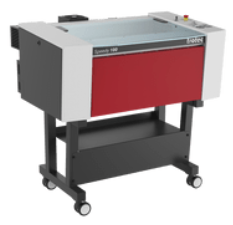
3D Printing & Digital Fluency Equipment
Our new Trotec Speedy 100 laser cutter arrived at the end of 2021. In 2022, we will develop the workflows and workshops in order to make this versatile tool available to the campus community. Here is a nice explanation of what a laser cutter can do:
“A laser cutter is a computer-controlled machine that uses a laser beam to precisely cut or engrave material. The laser beam causes the material to locally burn, melt or vaporize” (Maker Design Lab).
UVic students, faculty, and staff will be able to quickly “etch or cut wood, soft metal or vinyl to make prototypes, models, and more” to further their research projects (Markham Public Library).
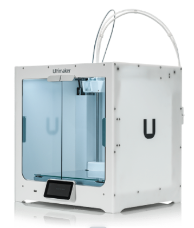 With the support of our Young Canada Works interns, Kenzie and Nathaniel, 3D Printing in the DSC is up dramatically post-pandemic. In 2021, we had $4,323 worth of printing done–in 2019, right before the COVID closure, we had $1,903. The dollar amount includes personal print jobs by UVic students, faculty, and staff and printing done for the Esquimalt and W̱SÁNEĆ First Nations language revitalization projects.
With the support of our Young Canada Works interns, Kenzie and Nathaniel, 3D Printing in the DSC is up dramatically post-pandemic. In 2021, we had $4,323 worth of printing done–in 2019, right before the COVID closure, we had $1,903. The dollar amount includes personal print jobs by UVic students, faculty, and staff and printing done for the Esquimalt and W̱SÁNEĆ First Nations language revitalization projects.
A major reason why we were able to increase the amount of 3D printing was the purchase of a new, larger-format 3D printer. Our new Ultimaker 5S (AKA “Claudia”) is able to print jobs that have more than double the base size and four times the volume as our wonderful little Ultimaker 3’s.
Graduate Student Experts & Young Canada Works Intern
Our “graduate student experts” continued to be very busy teaching workshops, creating new workshops, and offering consultation services in 2021. After UVic acquired campus licenses for NVIVO, our qualitative data analysis expert, Sharon, became busy teaching NVivo workshops. She consulted with faculty and students who were eager to conduct qualitative analyses of their unstructured data.
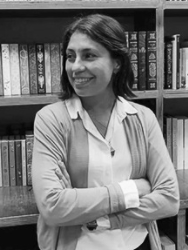 Our returning data analysis experts, Alex and Viet, were in constant demand for workshops and consultations throughout the year and taught multiple workshops on RStudio, Tableau, Excel, and LaTex.
Our returning data analysis experts, Alex and Viet, were in constant demand for workshops and consultations throughout the year and taught multiple workshops on RStudio, Tableau, Excel, and LaTex.
Felipe Gomez is our new Maps and Geospatial Data graduate expert; he has been consulting with students and teaching the QGIS and ArcGIS_Online workshops that he maintains and updates.
In September, we hired Nathaniel Loman as our Young Canada Works (YCW) graduate intern. Nathaniel graduated from the Math and Computer Science department at UVic and has done an excellent job migrating our workshops from Google Docs to GitHub on top of keeping up with the constant flow of new 3D-print jobs.
New Workshops for 2021
Qualitative Analysis with Taguette: Sharon Dias, our Qualitative Data analysis Graduate Assistant, developed a workshop based on the open-source software Taguette. Taguette does not have as many advanced features as NVivo does, but its basic functionality is easier to master and is free to use!
Image Editing with GIMP: Our own multimedia expert Dani Johnson has developed a new workshop for an open-source alternative to Adobe Photoshop. This free but powerful image editing software is called GIMP, which stands for GNU Image Manipulation Program; it is available on Windows, Mac, and Linux.
Smartphone Photography: In early 2020, Dani Johnson developed a workshop for SmartPhone Photography. This workshop is designed for people who would like to learn more about taking better photos with their smartphones; she was only able to teach it a couple of times before the campus closed. This workshop was highly hands-on, so it required significant reworking to be delivered online. It is now in our regular workshop rotation as either an online or in-person workshop.
Systematic Reviews: Zahra Premji created a Systematic Reviews workshop series. A systematic review uses a structured and reproducible method to identify, assess, and critically appraise all relevant studies in response to a specific research query. It can be either quantitative or qualitative and will generally take a team of researchers many months to complete.
Scopus: Monique Grenier, Sue Bengtson, and Emily Nickerson collaborated to create and teach their new Scopus workshop. “Scopus provides researchers with a tool to search, discover, analyze subject areas and fields of interest across science, technology, medicine, social science, and arts and humanities; [it] is similar to Web of Science.”
Student Feedback
“The libraries’ workshops are the best-kept secret on Campus!”
– Graduate Student
“Thank you very much for a very helpful Infographics workshop! I expected it to be a presentation but I loved the hands-on activities and the way you managed the zoom with the shared screens was impressive! In my doctoral studies, I realized how important it is to be able to convey your ideas, in fact that is what makes research accessible. That is what can make research an experience, it draws you in…. anyway, thanks for doing the workshop in such a thoughtful way.”
– School of Public Health & Social Policy Graduate Student
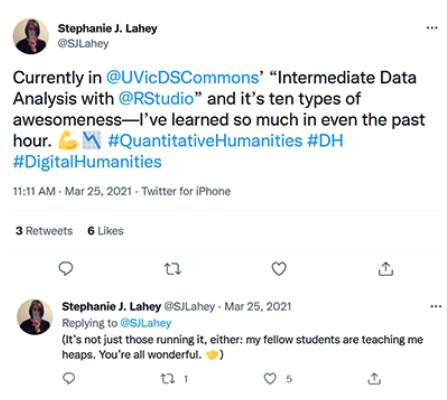 “When on a hiring committee I’d look favorably on people who include Library DSC Badges on their resume or LinkedIn account.”
“When on a hiring committee I’d look favorably on people who include Library DSC Badges on their resume or LinkedIn account.”
– Graduate Student
“It was a great experience learning Tableau through the [UVic Libraries DSC] workshop. I received my badge and have added it to my LinkedIn profile. Thank you very much! ”
– Undergraduate Student
“I have never felt more welcome at a Zoom workshop than how I felt at this 3D Design & Print workshop. The instructor’s efforts to greet and chat with me really helped to reduce how intimidated I felt since I didn’t have any experience with the topic. I was also so impressed with how generous the hosts were with their time and expertise. I was attending remotely and they took the time to answer my questions in detail. Thank you so much to your staff!”
– Faculty of Humanities Graduate Student
“Thank you, Sharon! Taguette is remarkably user-friendly and easy to work with. I like that it really simplifies the process of coding – especially when compared to NVIVO!”
– Graduate Student
More Information
If you would like to explore further services offered by the Digital Scholarship Commons, please take a look at these web pages:
- Main DSC Website
- Workshops that can be run in for-credit classes as guest lectures
- A listing of all DSC workshops with links to the full curriculum
- Tools loaned by the library
- DSC 3D Printing service
[/et_pb_text][et_pb_post_nav _builder_version=”4.19.4″ _module_preset=”default” prev_text=”%title” next_text=”%title” hover_enabled=”0″ sticky_enabled=”0″][/et_pb_post_nav][/et_pb_column][/et_pb_row][/et_pb_section]

